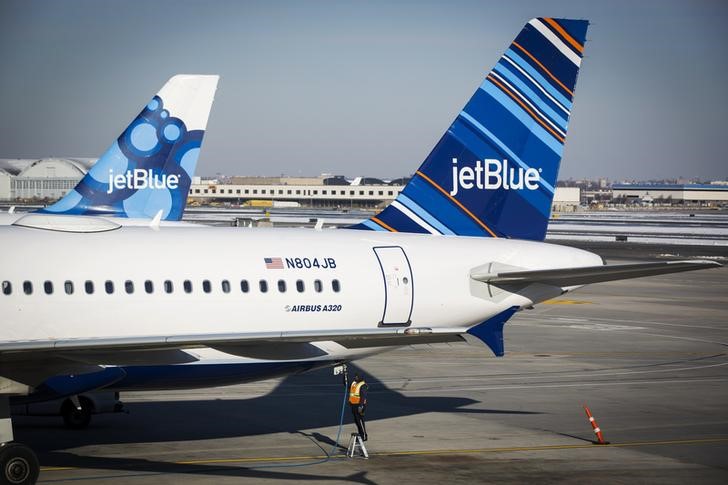© Reuters. FILE PHOTO: JetBlue Airbus A321LR is displayed at the 54th International Paris Air Show at Le Bourget Airport near Paris, France, June 20, 2023. REUTERS/Benoit Tessier/File Photo
By Rajesh Kumar Singh and Diane Bartz
CHICAGO/WASHINGTON (Reuters) – JetBlue Airways (NASDAQ:)’ decision to abandon its alliance with American Airlines (NASDAQ:) has improved its chances in the trial over a $3.8 billion deal to buy Spirit Airlines (NYSE:), but may not be enough to hand it a victory, antitrust experts said.
In its lawsuit filed in March aimed at stopping JetBlue’s purchase of Spirit, the U.S. Justice Department (DOJ) cited as evidence JetBlue’s alliance with American at airports in New York and Boston several times.
Calling the partnership a “de facto merger,” the DOJ argued that JetBlue’s proposed purchase of Spirit, a Florida-based ultra-low cost carrier, would lead to further industry concentration.
On Wednesday, JetBlue CEO Robin Hayes said ending the partnership with American has taken the DOJ’s “misplaced” concerns off the table and would help when the Spirit case goes to trial in October.
Eleanor Fox, an antitrust professor at New York University School of Law, said JetBlue would have found it even harder to win the Spirit trial by being in alliance with American because it had made the carrier a bigger player in certain markets.
“It improves the chances that JetBlue-Spirit will win the trial,” Fox said.
Former Federal Trade Commission Chairman William Kovacic, who now teaches at George Washington University law school, said the airline had to choose between the alliance and the Spirit merger as both could not survive regulatory scrutiny.
The alliance had allowed JetBlue access to American’s airport slots and customers, letting it add new routes and operate more flights out of airports in New York and Boston.
New York-based JetBlue, however, views the Spirit deal as a way to expand its domestic footprint amid persistent labor and aircraft shortages. It tried to buy Virgin America in 2016, but lost out to Alaska Air (NYSE:) Group.
To address antitrust concerns, JetBlue last month agreed to divest all holdings of Spirit at New York’s LaGuardia Airport to Frontier Group Holdings if it succeeds in closing the deal.
James Speta, a Northwestern (NASDAQ:) University law professor, is unsure the dissolution of the Northeast Alliance and the planned divestiture will be enough for JetBlue to prevail in the DOJ lawsuit.
A JetBlue-Spirit combination will “significantly” change the U.S. landscape of low-cost airlines and lead to further consolidation, he said.
American, Delta, United and Southwest Airlines (NYSE:) control nearly 80% of the U.S. airline industry.
In its lawsuit, the DOJ said Spirit’s acquisition would leave tens of millions of travelers to face higher fares and fewer options.
“There’s still an argument to be made against the merger,” Speta said.
Read the full article here





